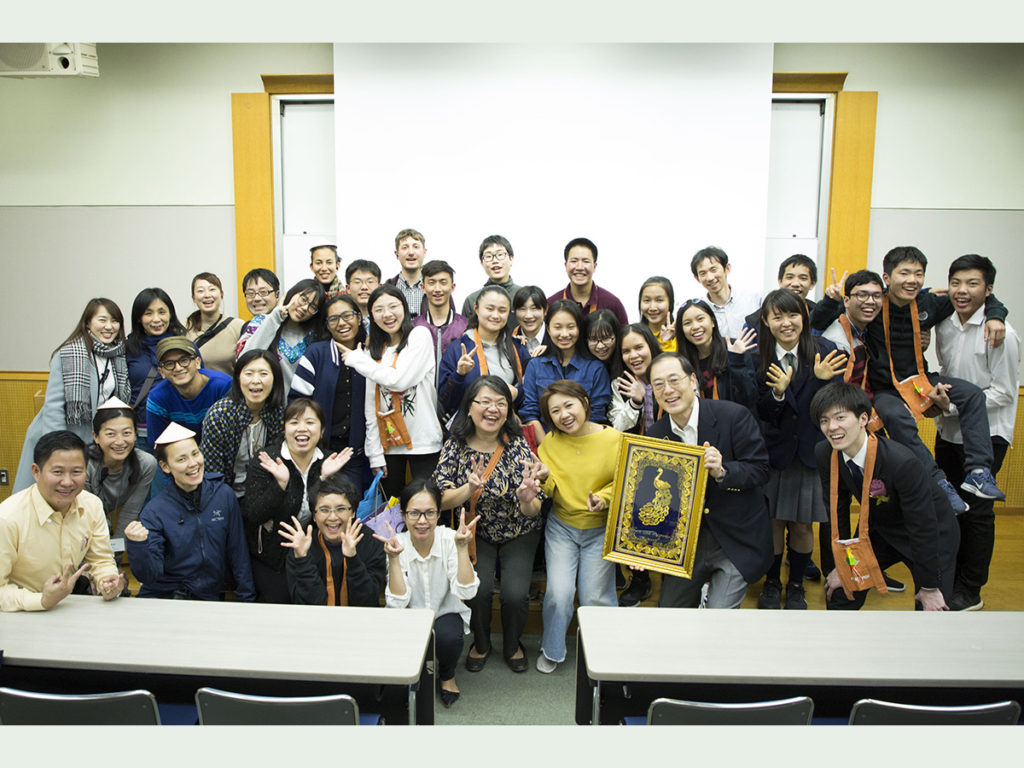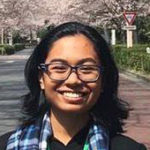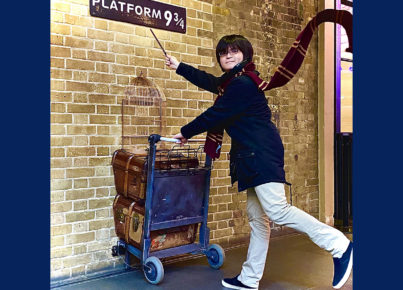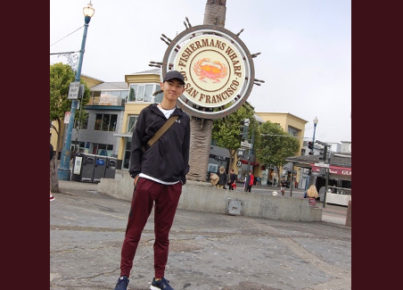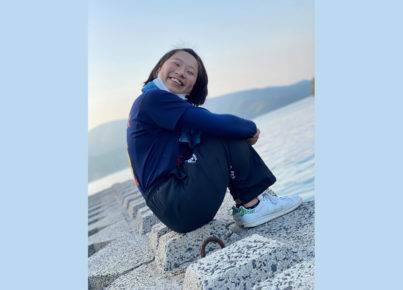“Tabula Rasa: Starting Again After Covid-19”
Vivienne Angelica H. Viernes
University student (Bachelor of Science in Chemical Engineering)
Philippines
Eat. Study. Workout. Sleep. Repeat.
This was my honest-to-god initial perception of what my Covid-19 lifestyle, especially being in more than 6 months of lockdown, would turn out to be. However, there were a lot of major changes that had taken place since the start of the pandemic here in my home country.
Right off the bat, one of the first things I had to get used to was the remote setup. I found myself having more time to take on opportunities outside academics, such as extracurriculars, in the first few months before the school year started. I have always used these activities to cope with my heavy workload in school since the former served as a breather.
With the ongoing pandemic, I have had my fair share of challenges when it came to projects that needed heavy coordination and socialization. I often hear the phrase “no man is an island” when it comes to work, and truly, this pandemic only reinforced that building a strong foundation together, along with good communication, gets the job done better and easier. I had to restructure my way of thinking and shift my energy to building up discipline rather than relying solely on motivation since there were a lot of days that it was difficult to stay motivated in a period where the anxiety and fear of the Covid-19 virus was high.
I took on several projects that involved me having to expand and learn more about my network even without having the chance to meet the people involved face to face. This leads me to one of the two realizations I had over the pandemic: regardless of circumstances, it is possible to form new genuine connections that have the same, if not stronger, level of trust, value, and communication, whilst strengthening old relationships into something even more timeless and ever-growing.
One of my favorite projects was spearheading the welcoming of the next batch of freshmen taking up my course in the university, where my team and I helped make them feel at home through online activities. Despite the situation, it was one of my most successful and rewarding headships, and the fulfillment I had with the steering committee from the kids expressing their gratitude for making their first year memorable was truly unmatched. Aside from this, I also had the chance to be accepted into a college organization that held a competitive application process–they looked into establishing connections with professionals and companies for learning opportunities and On-the-Job Training which contributed greatly to my personal growth in my hard and soft skills.
The second realization, and for me, the more important value that I learned during the pandemic situation was empathy. On a smaller scale, this could be as simple as understanding that your groupmate might not be able to hop on a Zoom call to work on your group project because they do not have stable internet connection. This could mean professors setting soft deadlines and shifting their attention to ensuring that students can understand their lessons without having to add to the ongoing stress of the pandemic. Indeed, empathy goes a long way.
With that, the kind of society I want to create after Covid-19 is one that knows how to be human–in the sense that we understand the concepts of accountability and empathy as ones that are not mutually exclusive. Most of the time, we tend to think that keeping accountability should revolve purely on quality work and professionalism, which is wrongly pictured to be cold and rigid. One of the most amazing features about humans is the innate ability to empathize–to put ourselves in the shoes of others even if we are not going through the same experience. In fact, empathy applies in being accountable as it entails being aware of what we can do to improve, which helps us to act in ways that are even more productive, excellently executed, and inclusive. The pandemic highlighted how important it is that soft skills, i.e. communication and planning, and objectivity, i.e. research based from statistics and data, be intertwined.
I cannot deny the fact that 2020 threw a lot at my country. Not only were we (and still are) struggling with handling the pandemic, but we also faced several natural disasters, political storms, and other chaos that stirred up and divided the Filipino people. Many struggled greatly this year and were exhausted from having to stay in a position where being praised to have a resilient soul seemed to be the only solution they could hang on to. In the simplest analogy, we might all be going through the same storm, but we are not on the same boats. Some people are on boats held together by tape just to stay afloat, while some are on cruise ships who have the privilege to live a relatively normal life despite the pandemic.
When you treat people with empathy and educate yourself of the privilege you are given, you connect and get to know people deeper and have a more concrete idea of what and how you can do your best to help someone in need. This, I believe, is how I gained a better understanding as to how and what changes I want to contribute as a next-generation leader.
As a 2nd year student in engineering, I see myself contributing to public service by promoting the concept [of engineering] as something for the mass and for the people. There has always been the stereotype that engineering is meant for those with a higher level of intelligence, especially in mathematics and the sciences. I have always advocated for science, innovation, and engineering as something that everyone should have an equal opportunity or chance to learn and understand in an approach that is accessible and considers the different backgrounds and extents of education that we have. This is why I strongly advocate for the SDGs, and it is why I continually push for access to the truth, to credible sources, to education. In the future, I hope to cater solutions to problems in a way that is easily available to and suitable for the Philippine and world setting. I hope to use my education in giving back to my country by applying the skills I will acquire with honesty and dignity in alleviating both local and national issues. Ultimately, I believe that with the world taken by storm in all its current madness, disasters, brilliance, and innovations, the frustrating truth is that we tend to forget the basic morals and interdisciplinary aspects that, in the first place, should have always been and should continue to always be major considerations in any decision we choose to proceed with, especially when tackling problems. All these skills, knowledge, and connections that we gain must be used in a way that is sincere–in a way that allows each one of us to be focused, precautious, mindful, and most importantly, human-centered–to remind us of how our actions and the balance we find between objectiveness and ethics can dictate, in the long run, how we can continually grow as individuals with the common goal of the world’s betterment.
食べる。勉強する。運動する。眠る。繰り返す。
これは、正直に言ってCovid-19禍での、新しい生活様式について、最初に抱いた感想でした。結果として、6か月以上続いたロックダウン中には特にそう思いました。そうは言っても、パンデミック以降、私の母国では多くの大きな変化がありました。
最初に慣れなければならなかったことの一つは、リモートワークに関する準備でした。学校が始まる前の数ヶ月間は、課外活動など、学業以外のことにも時間を割けるようになりました。課外活動は、息抜きになっていたので、学校での学習量の多さに対処するためにいつも利用してきました。
現在進行中のパンデミックの影響で、綿密な調整や社交性を必要とするプロジェクトへの参加は、かなり骨の折れることでした。「人は一人では生きられない」という言葉をよく耳にします。今回のパンデミックでは、コミュニケーションをしっかりと取りながら強固な基盤を築いていくことが、より良い仕事をより簡単に成し遂げることにつながることを改めて実感しました。私は、自分の考え方を改め、自分を鍛え、律していくことにエネルギーを割こうと思いました。それまでは、ただ、何とかモチベーションを保とうとしていましたが、それは、ウィルスに対する不安や恐怖が大きい中では難しいことでした。
私はいくつかのプロジェクトに関わりました。そこでは、関係者に直接会う機会がなくても、自分のネットワークを広げ、より多くを学ぶことになりました。これは、私がパンデミックで得た2つの気づきのうちの1つにつながっています:置かれている状況に関係なく、信頼、価値、コミュニケーションのレベルが同程度の、新たな本物のつながりを築くことは可能です。例えそれが、同程度の強さでなくても。一方で、古い関係をさらに時代を超えて成長し続けるものへと強化することもできます。
私の好きなプロジェクトの一つは、大学で私と同じコースを履修する新入生を歓迎する先頭に立って、オンラインでの活動を企画・実践するものでした。私たちは、オンラインでの活動を通じて新入生に居場所があるように感じてもらえるよう、手助けをしました。このような状況ではありましたが、私にとって最も成功した、やりがいと責任を伴う活動となりました。運営委員会を率い、後輩たちから、大学での1年目を思い出深いものにしてくれたことへの感謝の言葉をいただいたときの充実感は、他の追随を許さないものでした。それ以外にも、私は競争力の高い出願過程を伴う大学の組織に受け入れて頂くという機会に恵まれました。この組織は、専門家や企業とのつながりを築き、学習や、実際の仕事の現場での研修の機会を提供してくれました。これは私のハードスキル(学術や技術的な能力)とソフトスキル(対人交渉などの能力)の成長に大きく貢献しました。
2つ目の気づきは、共感的理解です。これは、私にとって、パンデミックの状況下で学んだ、とても重要な価値観です。小規模で考えると例えば、友達が安定したインターネット接続がないのでZoomでのミーテイングに参加できない可能性があることを理解するのと同じくらいのことだと言えるでしょう。また、教授たちが柔軟な締め切りを設定し、継続中のパンデミックから受けている以外のストレスを増やさずに、学生が授業を理解できることに焦点を当てていることも同じでしょう。確かに、共感的理解ははとても大切なことです。
それを踏まえて私は、Covid-19の後に、互いが排他的であるのではなく、説明責任や共感的理解について理解していて、その中で人が「人として」振舞える社会を創っていければ、と思います。ほとんどの場合において、私たちは、説明責任とは、仕事の場やプロフェッショナルな人たちにしか関係のないことだと思っています。そして、説明責任という言葉が冷たく、柔軟性のないものである、というイメージが独り歩きしているのです。人が持つ素晴らしい能力の一つに、共感的理解ができるというものがあります。例え同じ経験をしていなくても、他者の立場になって考えることができるのです。事実、共感的理解は、説明責任を果たそうとする時にも生じているのです。なぜならば、共感的理解とは、どうすれば何かを改善できるのか、ということを意識させ、そして、さらに生産性的に、優れた実行力を伴って、包括的な行動ができるように私たちを促すからです。パンデミックは、コミュニケーション力、計画性などのソフトスキルと、統計やデータを基にした調査などの客観性が絡み合うことがいかに重要であるかということを浮き彫りにしました。
2020年は私の国に多くのことを投げかけたという事実を否定することはできません。パンデミックへの対応に苦労した(現在進行形でもありますが)だけでなく、いくつかの自然災害、政治的な混乱やその他の混沌が、フィリピンの人々をかき乱し、分裂させました。今年は多くの人が多大な苦労を強いられ、回復力のある強い心を持っていると褒められることが唯一の解決策のように見える立場に留まらなければならないことに疲れ果てていました。最も簡単な例えで言えば、私たちは皆同じ嵐の中を通っているかもしれませんが、同じ船に乗っているわけではありません。ある人々は浮いたままでいるためにテープで繋がれた船に乗っているし、ある人々はパンデミックにもかかわらず、比較的普通の生活を送る特権を持っているクルーズ船に乗っているのです。
共感を持って人に接し、自分に与えられた特権を自分自身に教育するとき、人とつながり、人をより深く知り、困っている人を助けるために何をすれば、またどうすれば最善が尽くせるのか、について、より具体的な考えを持つことができます。そうすることで、自分が次世代のリーダーとして、どのように変化していきたいのかを理解することができるのだと思います。
工学部2年生の私は、「工学は大衆のためのもの、人のためのもの」という考え方を広めることで、社会に貢献していきたいと考えています。これまで工学というと、数学や理科系を中心とした知能の高い人たちのものという固定観念がありました。私は、科学、技術革新、工学を、誰もが平等に学び、理解する機会を持つべきだと提唱してきました。さまざまな背景や教育の範囲を考慮し、学びやすい方法で機会が提供されるべきです。これが私がSDGsを強く提唱する理由であり、正しい情報を得ること、信頼できる情報源を持つこと、教育の機会を得ることを継続的に推進する理由でもあります。将来的には、フィリピンや世界の状況に合わせて、簡単に利用できる方法で、問題の解決策を提供したいと思っています。私は、身につけたスキルを正直さと尊厳を持って、地域や国の問題を軽減するために応用し、国に恩返しをするために教育を活用したいと思っています。
結局のところ、世界が狂気、災害、輝き、革新の嵐にさらされている中で、私たちは、基本的なモラルや多くの学問分野にまたがる領域を忘れてしまいがちなのです。特に問題を解決しなければならない時、何かを決断しなければなりませんが、そのような時こそ、多くの学問分野にまたがる領域のことを思い出し、主要な解決策になりうる、という視点を持つべきではないでしょうか。私たちがこれまでに得てきた、技術、知識、そしてつながりは誠実に使われるべきです。一人一人に焦点が当たり、慎重に、思慮深く使われなければなりません。さらに、最も重要なこととして、「人間が中心である」ということは、以下の点を常に念頭においておかなければなりません。一つは、客観性と倫理の狭間にある、私たちの行動やバランスがいかに影響するか、ということです。次に、長期的に見た時に、世界がよりよくなるために、共通の目標として、一人一人がいかに成長を続けていけるか、ということです。
